20 june 2018
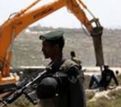
Israeli soldiers delivered, Wednesday, demolition orders targeting seven wells and a shed, in Teqoua’ town, south of Bethlehem in the occupied West Bank.
The soldiers handed seven orders for the demolition of water wells built on private Palestinian lands.
The wells are owned by Ahmad Khalaf Jibreel, Ibrahim Mohammad Jibreel, and Salem Za’al Jibreel, Atiya Mousa Jibreel, Salam Abu Mfarreh, Ali Mahmoud Khatib and Ali Yousef Nuwwara.
Furthermore, the soldiers handed another demolition order targeting a shed, owned by Monir Mahmoud Suleiman.
The soldiers handed seven orders for the demolition of water wells built on private Palestinian lands.
The wells are owned by Ahmad Khalaf Jibreel, Ibrahim Mohammad Jibreel, and Salem Za’al Jibreel, Atiya Mousa Jibreel, Salam Abu Mfarreh, Ali Mahmoud Khatib and Ali Yousef Nuwwara.
Furthermore, the soldiers handed another demolition order targeting a shed, owned by Monir Mahmoud Suleiman.
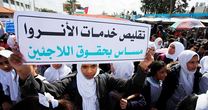
UN peace coordinator Nickolay Mladenov has warned the UNRWA intends to delay payment of salaries to its employees and suspend some of its operations.
In his briefing to the Security Council on Tuesday, Mladenov also said that the UNRWA would shrink the urgent aid provided for Palestinian refugees in Gaza and other areas.
“Facing an unprecedented shortfall of over USD 250 million, UNRWA is weeks away from painful cuts to its emergency assistance for Gaza and elsewhere in the region,” he affirmed.
“In Gaza itself, this would include a deferral of salaries to some of its workforce in July and the start of suspending core operations in August. UNRWA and its stakeholders are making every effort to ensure that essential operations continue.
To this end, a pledging conference will be held here in New York on the 25th June,” the UN official added.
In his briefing to the Security Council on Tuesday, Mladenov also said that the UNRWA would shrink the urgent aid provided for Palestinian refugees in Gaza and other areas.
“Facing an unprecedented shortfall of over USD 250 million, UNRWA is weeks away from painful cuts to its emergency assistance for Gaza and elsewhere in the region,” he affirmed.
“In Gaza itself, this would include a deferral of salaries to some of its workforce in July and the start of suspending core operations in August. UNRWA and its stakeholders are making every effort to ensure that essential operations continue.
To this end, a pledging conference will be held here in New York on the 25th June,” the UN official added.
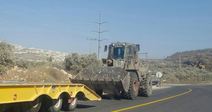
The Israeli occupation forces (IOF) on Wednesday morning closed a Palestinian agricultural road to the northwest of the West Bank city of Salfit.
Palestinian farmers reported that they were surprised by the closure of the only agricultural road in the northern area of the city.
Anti-settlement researcher Khaled Ma'ali said that the blocked road serves dozens of Palestinian farmers from Haris and Kifl Haris towns.
Ma'ali added that this move is aimed at pushing Palestinian farmers to abandon their lands in favor of the expansion of the illegal Israeli settlement of Ariel.
He pointed out that the IOF had razed vast tracts of Palestinian farmlands in the northern and western areas of Salfit with the aim of making Ariel settlement the capital of "Samaria", according to senior Israeli officials, which blatantly violates international law.
Palestinian farmers reported that they were surprised by the closure of the only agricultural road in the northern area of the city.
Anti-settlement researcher Khaled Ma'ali said that the blocked road serves dozens of Palestinian farmers from Haris and Kifl Haris towns.
Ma'ali added that this move is aimed at pushing Palestinian farmers to abandon their lands in favor of the expansion of the illegal Israeli settlement of Ariel.
He pointed out that the IOF had razed vast tracts of Palestinian farmlands in the northern and western areas of Salfit with the aim of making Ariel settlement the capital of "Samaria", according to senior Israeli officials, which blatantly violates international law.
19 june 2018
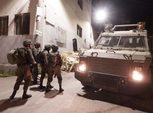
Groups of extremist illegal Israeli colonizers invaded, Tuesday, Palestinian farmlands near Tiwana village, east of Yatta town, south of the southern West Bank city of Hebron, and uprooted dozens of trees.
Rateb Jabour, the media coordinator of the Popular Committee against the Annexation Wall and Colonies in southern Hebron, said the Israeli assailants brought electric saws, and bulldozers, before uprooting the trees.
He added that the attacked lands are owned by Palestinians from the families of Morr, Abu Qbeita and Moghannam.
Jabour also stated that the attack is part of the ongoing attempts to expand the illegal Ma’on and Havat Ma’on colonialist outposts, built on private Palestinian lands east of Yatta town.
The colonizers have been conducting repeated violations and invasions into the Palestinian lands in the area to expand many nearby colonies and outposts, such as Karmiel, Avigal, Mitzpe Yair, in addition to Ma’on and Havat Ma’on.
It is worth mentioning that the Palestinians have been denied access to their own lands for several years, due to illegal Israeli policies aiming at removing them from their lands, to build and expand the colonies and outposts.
Rateb Jabour, the media coordinator of the Popular Committee against the Annexation Wall and Colonies in southern Hebron, said the Israeli assailants brought electric saws, and bulldozers, before uprooting the trees.
He added that the attacked lands are owned by Palestinians from the families of Morr, Abu Qbeita and Moghannam.
Jabour also stated that the attack is part of the ongoing attempts to expand the illegal Ma’on and Havat Ma’on colonialist outposts, built on private Palestinian lands east of Yatta town.
The colonizers have been conducting repeated violations and invasions into the Palestinian lands in the area to expand many nearby colonies and outposts, such as Karmiel, Avigal, Mitzpe Yair, in addition to Ma’on and Havat Ma’on.
It is worth mentioning that the Palestinians have been denied access to their own lands for several years, due to illegal Israeli policies aiming at removing them from their lands, to build and expand the colonies and outposts.
18 june 2018
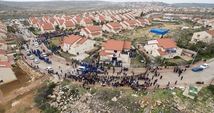
Eyewitnesses on Monday reported that a new expansion project has been launched in Tzofim settlement, northeast of Qalqilya city, at the expense of neighboring Palestinian farmlands in Jayyous village.
The witnesses told the PIC reporter that the owners of the farmlands adjacent to the settlement have been long denied access to their lands.
Anti-settlement researcher Khaled Ma'ali said that Tzofim was established in 1989. The largest part of the settlement was built in Jayyous village while the remaining part is located on lands belonging to Azzun village.
Ma'ali added that Tzofim is located 2 km northeast of Qalqilya city and is only 800 meters away from the Green Line.
The witnesses told the PIC reporter that the owners of the farmlands adjacent to the settlement have been long denied access to their lands.
Anti-settlement researcher Khaled Ma'ali said that Tzofim was established in 1989. The largest part of the settlement was built in Jayyous village while the remaining part is located on lands belonging to Azzun village.
Ma'ali added that Tzofim is located 2 km northeast of Qalqilya city and is only 800 meters away from the Green Line.
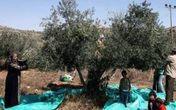
Israeli soldiers attacked, Monday several Palestinian farmers in Halhoul and Beit Ummar towns, north of Hebron, in the southern part of the occupied West Bank, and stole their produce.
Media sources in Hebron said the farmers were selling their fruits and vegetables near their farmlands, and in front of their homes, near the main Jerusalem-Hebron Road.
They added that the soldiers assaulted the farmers and stole their produce before loading it into trucks before driving away.
The farmers depend on the produce of their lands to support themselves and their families, but are subjected to constant assaults by both Israeli soldiers and colonialist settlers, living on stolen Palestinian lands.
Media sources in Hebron said the farmers were selling their fruits and vegetables near their farmlands, and in front of their homes, near the main Jerusalem-Hebron Road.
They added that the soldiers assaulted the farmers and stole their produce before loading it into trucks before driving away.
The farmers depend on the produce of their lands to support themselves and their families, but are subjected to constant assaults by both Israeli soldiers and colonialist settlers, living on stolen Palestinian lands.

Israeli settler groups on Monday resumed their daily break-ins into al-Aqsa Mosque under police protection.
Spokesman for Jerusalem's Islamic Awqaf Department Feras al-Dibs said that about 30 settlers, escorted by the Israeli police, broke into al-Aqsa Mosque via al-Maghareba Gate in the early morning hours.
Al-Dibs added that the Israeli police arrested the head of the Awqaf security department at al-Aqsa Mosque Abdullah Abu Taleb near al-Rahma Gate.
The arrest came after settler groups claimed on social media websites that the cleaning campaign launched in al-Rahma Gate area following some restorations there is an "act of vandalism".
The Israeli police further uprooted olive trees planted in the area and destroyed the new stairs built of al-Aqsa Mosque stones.
Spokesman for Jerusalem's Islamic Awqaf Department Feras al-Dibs said that about 30 settlers, escorted by the Israeli police, broke into al-Aqsa Mosque via al-Maghareba Gate in the early morning hours.
Al-Dibs added that the Israeli police arrested the head of the Awqaf security department at al-Aqsa Mosque Abdullah Abu Taleb near al-Rahma Gate.
The arrest came after settler groups claimed on social media websites that the cleaning campaign launched in al-Rahma Gate area following some restorations there is an "act of vandalism".
The Israeli police further uprooted olive trees planted in the area and destroyed the new stairs built of al-Aqsa Mosque stones.
14 june 2018
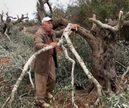
A group of illegal Israeli colonizers invaded, Thursday, Palestinian olive orchards in Khirbet Beit Iskariya village, southwest of Bethlehem, in the occupied West Bank, and cut 200 trees.
Hasan Breijiyya, the coordinator of the Popular Committee against the Annexation Wall and Colonies in Bethlehem, said the Israeli assailants cut at least 200 olive trees, owned by Kamil Khalil Sa’ad and ‘Amer Hussein Odah.
He stated that the attack is second of its kind in less than two weeks and added that the village is subject to frequent violations.
The village, inhabited by approximately 650 Palestinians, started losing its land to illegal Israel’s colonies since Israel the occupied West Bank in 1967, and started establishing many colonies, including Kfar Etzion, Alon Shvut, Migdal Oz, Neve Daniel, Beit Ayin, Rosh Tzurim, Beitar Illit, Efrat and Elazar.
Beit Iskariya village contains five residential communities; Khirbit Iskariya, Khallet al-Ballout, Wadi Shakhit, Khallet Afffana and Shafe’ey area.
Its size used to be 9000 Dunams and lost 2000 for the illegal construction and expansion of Israel’s colonies, and is currently surrounded by colonies in addition to being subject to constant violations amidst attempts to remove its population.
The villagers live in old small brick homes, as Israel does not permit the families to build or develop their communities, in addition to demolishing seven homes since 2007.
Hasan Breijiyya, the coordinator of the Popular Committee against the Annexation Wall and Colonies in Bethlehem, said the Israeli assailants cut at least 200 olive trees, owned by Kamil Khalil Sa’ad and ‘Amer Hussein Odah.
He stated that the attack is second of its kind in less than two weeks and added that the village is subject to frequent violations.
The village, inhabited by approximately 650 Palestinians, started losing its land to illegal Israel’s colonies since Israel the occupied West Bank in 1967, and started establishing many colonies, including Kfar Etzion, Alon Shvut, Migdal Oz, Neve Daniel, Beit Ayin, Rosh Tzurim, Beitar Illit, Efrat and Elazar.
Beit Iskariya village contains five residential communities; Khirbit Iskariya, Khallet al-Ballout, Wadi Shakhit, Khallet Afffana and Shafe’ey area.
Its size used to be 9000 Dunams and lost 2000 for the illegal construction and expansion of Israel’s colonies, and is currently surrounded by colonies in addition to being subject to constant violations amidst attempts to remove its population.
The villagers live in old small brick homes, as Israel does not permit the families to build or develop their communities, in addition to demolishing seven homes since 2007.
13 june 2018
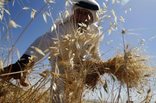
Israeli army forces reportedly ordered a Palestinian farmer in the Jordan Valley to evacuate his land on Tuesday, with forces saying they were going to raze the land.
WAFA agency said, according to Ma’an, that Ahmad Assi Damra, from Hijlet al-Zour, east of Jericho, was ordered to evacuate his 25 dunam (six acre) plot of land, which is planted with palm trees, in order raze it.
A similar order was reportedly made to another Palestinian farmer, Suleiman al-Zayed, who has planted his four dunam plot in the village of Nuweimeh, north of Jericho, with olive trees.
The majority of the Jordan Valley is under full Israeli military control, despite being within the West Bank. Meanwhile, at least 44 percent of the total land in the Jordan Valley has been appropriated by Israeli forces, for military purposes and training exercises.
Forming a third of the occupied West Bank and with 88 percent of its land classified as Area C, the Jordan Valley has long been a strategic area of land unlikely to return to Palestinians following Israel’s occupation in 1967.
WAFA agency said, according to Ma’an, that Ahmad Assi Damra, from Hijlet al-Zour, east of Jericho, was ordered to evacuate his 25 dunam (six acre) plot of land, which is planted with palm trees, in order raze it.
A similar order was reportedly made to another Palestinian farmer, Suleiman al-Zayed, who has planted his four dunam plot in the village of Nuweimeh, north of Jericho, with olive trees.
The majority of the Jordan Valley is under full Israeli military control, despite being within the West Bank. Meanwhile, at least 44 percent of the total land in the Jordan Valley has been appropriated by Israeli forces, for military purposes and training exercises.
Forming a third of the occupied West Bank and with 88 percent of its land classified as Area C, the Jordan Valley has long been a strategic area of land unlikely to return to Palestinians following Israel’s occupation in 1967.
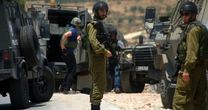
The Israeli occupation forces (IOF) on Wednesday confiscated a bulldozer being used by a Palestinian to reclaim agricultural lands in Aqraba town south of Nablus.
Anti-settlement activist Yousef Deiriya told Wafa news agency that the bulldozer was rehabilitating lands for agricultural purposes when the IOF stopped the driver and seized the vehicle under the pretext that it was working on "state lands".
Israeli-claimed "state lands" in the West Bank are then often used as construction sites for Jewish-only settlements in violation of international law.
Anti-settlement activist Yousef Deiriya told Wafa news agency that the bulldozer was rehabilitating lands for agricultural purposes when the IOF stopped the driver and seized the vehicle under the pretext that it was working on "state lands".
Israeli-claimed "state lands" in the West Bank are then often used as construction sites for Jewish-only settlements in violation of international law.
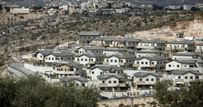
The Israeli occupation authority (IOA) has continued to expand the illegal settlement of Elkana at the expense of Palestinian land in Mas-ha village, west of Salfit in the West Bank.
Local sources told the Palestinian Information Center (PIC) on Wednesday morning that there were construction activities underway in the northwestern area of the village aimed at building a new academic facility for Jewish settlers.
Meanwhile, the IOA prevents local farmers from going to their plots of land behind the separation wall and rarely allows them to cultivate and take care of their land for a few minutes, according to the sources.
The sources voiced fears that the lands behind the wall could be exposed to annexation and bulldozing as part of the new settlement expansion activities.
Israel's settlement construction, which is illegal under international law, is seen as an obstacle to any lasting peace with the Palestinians, who want their future state to be on land much of which Israel has annexed or built settlements on.
Local sources told the Palestinian Information Center (PIC) on Wednesday morning that there were construction activities underway in the northwestern area of the village aimed at building a new academic facility for Jewish settlers.
Meanwhile, the IOA prevents local farmers from going to their plots of land behind the separation wall and rarely allows them to cultivate and take care of their land for a few minutes, according to the sources.
The sources voiced fears that the lands behind the wall could be exposed to annexation and bulldozing as part of the new settlement expansion activities.
Israel's settlement construction, which is illegal under international law, is seen as an obstacle to any lasting peace with the Palestinians, who want their future state to be on land much of which Israel has annexed or built settlements on.
11 june 2018
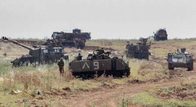
Palestinian farmers in the northern West Bank town of Aqraba, south of Nablus, complained on Monday that Israeli army military training, in their area, has destroyed their crops.
WAFA reported that, according to Yousef Dirieh, an activist in the anti-settlement committee of Aqraba, the Israeli army was conducting training with live ammunition in Khirbet al-Tawil, an area in Aqraba.
He said that the exercises are being conducted in the vicinity of residential homes and between them, and in agricultural land, destroying crops and causing serious loss to farmers.
WAFA reported that, according to Yousef Dirieh, an activist in the anti-settlement committee of Aqraba, the Israeli army was conducting training with live ammunition in Khirbet al-Tawil, an area in Aqraba.
He said that the exercises are being conducted in the vicinity of residential homes and between them, and in agricultural land, destroying crops and causing serious loss to farmers.
10 june 2018
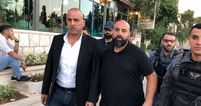
The Israeli police on Saturday evening arrested the head of the chamber of commerce in Jerusalem Kamal Obeidat and his deputy Raed Sa'ada and took them for interrogation over their organization of an Iftar gathering for journalists.
The police, accompanied by intelligence officers, stormed Jerusalem Hotel, surrounded it, forced all people inside the hotel out, and distributed an order banning Ramadan Iftar gatherings in the place.
The Israeli authorities have been gradually trying to ban Palestinian events of any kind in Jerusalem encouraged by the US recognition of the holy city as Israel's capital.
In another context, the Israeli-controlled Jerusalem municipality on Sunday morning confiscated equipment belonging to Palestinian shops in the Old City of Jerusalem.
The municipality claimed that the owners of these shops had brought the confiscated equipment without obtaining a legal license.
The Ramadan season was always considered a chance by Jerusalem traders to revive the city's economy. However, Israel's tightened restrictions recently have created a state of stagnation among Jerusalem markets.
These measures include the municipality's daily targeting of Palestinian shops and stalls, especially in the Old City, and the ban imposed on Palestinian women coming from neighboring villages to sell their vegetables and handcrafts in Jerusalem.
The police, accompanied by intelligence officers, stormed Jerusalem Hotel, surrounded it, forced all people inside the hotel out, and distributed an order banning Ramadan Iftar gatherings in the place.
The Israeli authorities have been gradually trying to ban Palestinian events of any kind in Jerusalem encouraged by the US recognition of the holy city as Israel's capital.
In another context, the Israeli-controlled Jerusalem municipality on Sunday morning confiscated equipment belonging to Palestinian shops in the Old City of Jerusalem.
The municipality claimed that the owners of these shops had brought the confiscated equipment without obtaining a legal license.
The Ramadan season was always considered a chance by Jerusalem traders to revive the city's economy. However, Israel's tightened restrictions recently have created a state of stagnation among Jerusalem markets.
These measures include the municipality's daily targeting of Palestinian shops and stalls, especially in the Old City, and the ban imposed on Palestinian women coming from neighboring villages to sell their vegetables and handcrafts in Jerusalem.
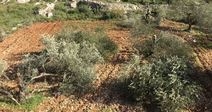
Israeli settlers have uprooted dozens of olive trees Planted on Palestinian land north of Ramallah province, in the central Occupied West Bank.
Israeli settlers stormed Palestinian lands in Termas’iya village, north of Ramallah, and pulled up several olive trees.
Around 10 million olive trees are planted on Palestinian land, including in the occupied West Bank and the blockaded Gaza Strip.
They are the only sources of income for nearly 100,000 farmers living across the occupied Palestinian territories.
The Palestinian government has no jurisdiction over Israelis in the occupied West Bank, and violations carried out by Israeli settlers often occur in the presence of Israeli military forces who rarely act to protect the Palestinians.
The majority of settler thefts and attacks committed against Palestinians are met with impunity, with Israelis rarely facing consequences for such thefts.
Israeli settlers stormed Palestinian lands in Termas’iya village, north of Ramallah, and pulled up several olive trees.
Around 10 million olive trees are planted on Palestinian land, including in the occupied West Bank and the blockaded Gaza Strip.
They are the only sources of income for nearly 100,000 farmers living across the occupied Palestinian territories.
The Palestinian government has no jurisdiction over Israelis in the occupied West Bank, and violations carried out by Israeli settlers often occur in the presence of Israeli military forces who rarely act to protect the Palestinians.
The majority of settler thefts and attacks committed against Palestinians are met with impunity, with Israelis rarely facing consequences for such thefts.
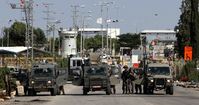
The Israeli occupation authorities on Saturday evening announced that al-Jalamah crossing, north of the West Bank province of Jenin, will be closed every day at 10 pm.
Head of the chamber of commerce in Jenin Ammar Abu Baker said that the Israeli authorities decided to close al-Jalamah crossing at 10 pm every day until 18th June.
Abu Baker said that the crossing is usually opened during the last days of Ramadan and Eid days until midnight.
Abu Baker refuted the Israeli allegations about facilities provided at the West Bank military crossings with the approach of Eid al-Fitr.
He stressed that this decision, which falls in line with a collective punishment policy pursued against the Palestinian people, would cause heavy economic losses.
In another context, the Israeli occupation forces (IOF) Saturday attacked Palestinian Red Crescent Society (PRCS) crews who were trying to provide aid to people injured in a traffic accident near Gush Etzion settlement, south of Bethlehem.
Director of the PRCS emergency department in Bethlehem Mohammed Awad said that the department was informed about a traffic accident near Gush Etzion settlement, and when the ambulance crews rushed to the scene they were prevented by the IOF soldiers from approaching the injured.
Awad said that the soldiers assaulted the Palestinian officer Jamal al-Balboul, 51, and pointed a gun at his face.
He added that this act violates all international norms which ensure the ambulance crews' access to the injured to provide assistance.
Head of the chamber of commerce in Jenin Ammar Abu Baker said that the Israeli authorities decided to close al-Jalamah crossing at 10 pm every day until 18th June.
Abu Baker said that the crossing is usually opened during the last days of Ramadan and Eid days until midnight.
Abu Baker refuted the Israeli allegations about facilities provided at the West Bank military crossings with the approach of Eid al-Fitr.
He stressed that this decision, which falls in line with a collective punishment policy pursued against the Palestinian people, would cause heavy economic losses.
In another context, the Israeli occupation forces (IOF) Saturday attacked Palestinian Red Crescent Society (PRCS) crews who were trying to provide aid to people injured in a traffic accident near Gush Etzion settlement, south of Bethlehem.
Director of the PRCS emergency department in Bethlehem Mohammed Awad said that the department was informed about a traffic accident near Gush Etzion settlement, and when the ambulance crews rushed to the scene they were prevented by the IOF soldiers from approaching the injured.
Awad said that the soldiers assaulted the Palestinian officer Jamal al-Balboul, 51, and pointed a gun at his face.
He added that this act violates all international norms which ensure the ambulance crews' access to the injured to provide assistance.
